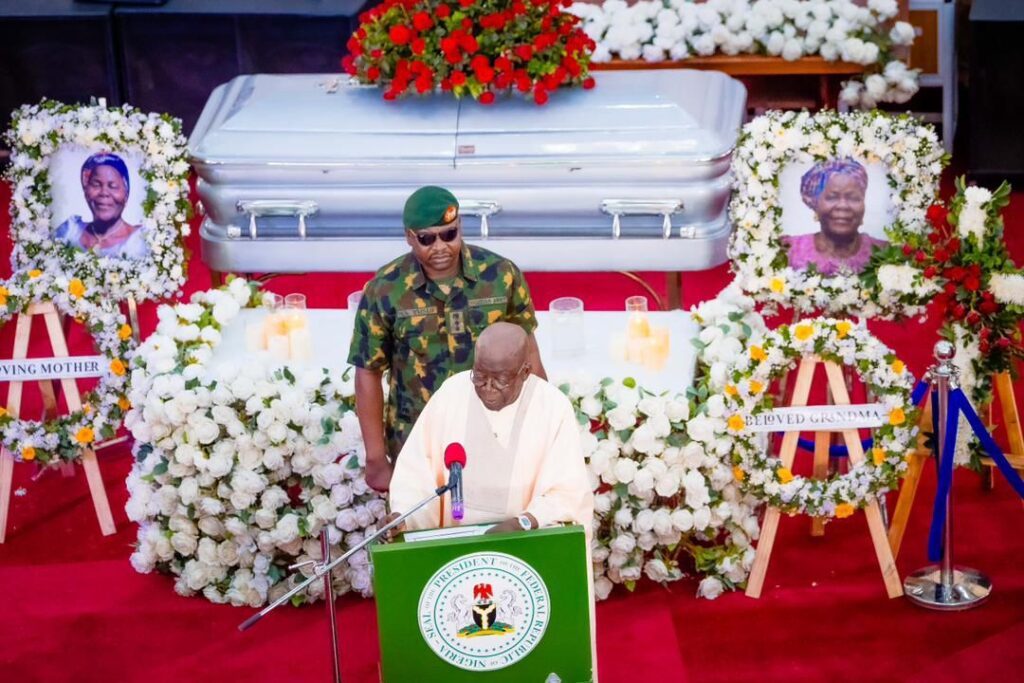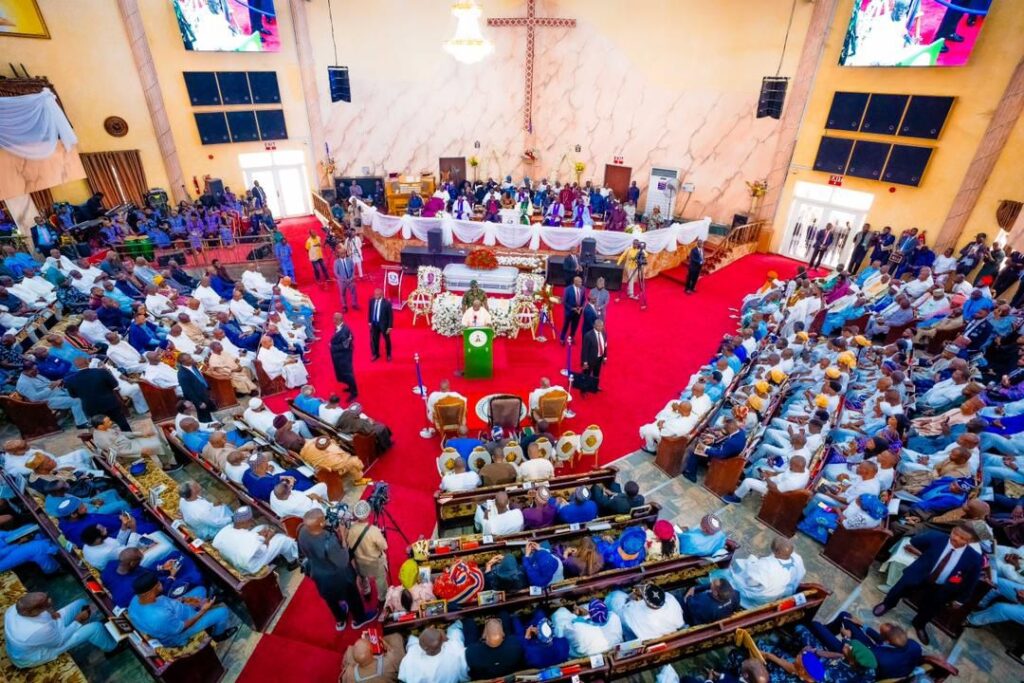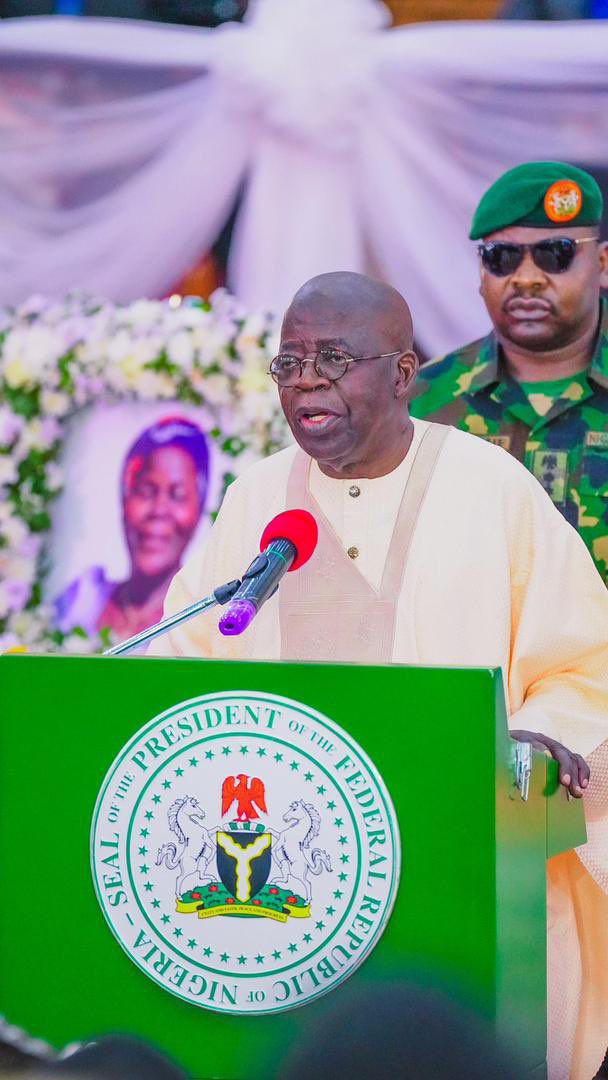President Bola Ahmed Tinubu used a solemn family occasion in Jos to deliver a clear appeal for peace and religious tolerance, telling congregants at the Church of Christ in Nations headquarters that Nigeria’s unity depends on mutual respect across faiths. The president spoke at the funeral service of the late Nana Lydia Yilwatda, mother of the All Progressives Congress national chairman, Professor Nentawe Yilwatda, and he framed his remarks in simple but pointed terms: hate is not an option and the example of his own home shows how faith can be an instrument of unity rather than division.
Tinubu told the crowd that he inherited Islam and that his wife is a pastor who prays for him. He used that personal detail to underline his central message, saying he has never tried to convert his spouse and that faith should not be used to build walls between neighbours. His comments were both personal and political, delivered before a gathering that included senior lawmakers, governors and other national figures who attended to pay respects to the late matriarch.

The funeral service carried more than private grief. It was a rare public moment where the president could speak directly to religious leaders and communities in Plateau State, an area that has seen recurrent tensions. Tinubu’s appeal came with a wider call for mutual understanding among Nigeria’s diverse ethnic and religious groups and an insistence that public life must prioritise harmony and coexistence. He described the late Nana Lydia as a life of faith and service and urged Nigerians to treat one another with the same compassion.
The event also highlighted an effort by the presidency to keep religious peace on the national agenda. The president’s presence and his words were acknowledgement that religious tensions, especially in middle belt states, require constant attention from the highest level of government. Local leaders who spoke at the service echoed that sentiment. Governor Caleb Mutfwang of Plateau State thanked the president for coming despite a tight schedule and appealed for continued federal partnership to tackle insecurity and support local development initiatives.
The gathering was attended by a who is who of the country’s political class. Senate and House leadership were present along with sitting and former governors and federal officials. Their attendance reinforced the public nature of the message Tinubu delivered: this was not simply a condolence visit but an opportunity to reinforce national cohesion at a time when many Nigerians are fatigued by recurring conflicts that are sometimes cast in religious terms.
Tinubu’s remarks are likely to be judged on two counts: the sincerity of the sentiment and the practical steps that follow. Words at a funeral reverberate differently from policy statements at the State House, and observers will watch whether the administration translates the call for tolerance into visible measures that protect worshippers, penalise attacks on places of worship and work with local communities to reduce the drivers of violence. The president’s emphasis on family and faith offers a moral anchor for that work, but the policy apparatus must follow.
Religious leaders at the service used the occasion to remind political actors of their responsibilities too. The sermon that preceded the president’s remarks drew on Ecclesiastes and framed time as a divine resource that should be used wisely. Those pastoral themes dovetail with new urgency from civil society groups calling for stronger protections for vulnerable communities and better coordination between security forces and local institutions. A consistent thread of the day was the hope that national attention will translate into durable action on security and social cohesion.

Plateau State’s governor referenced ongoing projects tied to national reforms and appealed for sustained support to tackle the twin problems of insecurity and underdevelopment that feed local grievances. He singled out agriculture and public transport projects and urged the president to visit the state again to witness progress. Those requests highlight the link between governance, economic opportunity and social stability that underlies many incidents of communal tension.
The wider context matters. Nigeria has in recent years faced repeated allegations internationally about attacks framed as religious persecution. The president’s public embrace of religious coexistence at a high profile event directly counters narratives that the state is indifferent to the plight of any faith community. Whether it will change perceptions abroad will depend on sustained action at home: clear investigations of attacks, prosecution of perpetrators, and practical support to affected communities. For citizens, the imperative is more immediate. They measure promises by daylight and by the security of their streets and places of worship.
For now the message delivered in Jos is unambiguous. Tinubu called for mutual respect and for Nigerians to choose love over hatred. He pointed to his own household as a working example and he asked political and religious leaders to lead by example. The funeral of Nana Lydia Yilwatda was a private moment of grief and a public call to conscience. If the call is heeded and followed by policy and enforcement, it could be a moment of renewed national resolve to protect pluralism and to defuse tensions before they escalate. If it remains rhetoric without follow through, it will be quickly forgotten. The burden now lies with the state and society to turn an appeal for tolerance into the steady work of peace.
Samuel Aina

